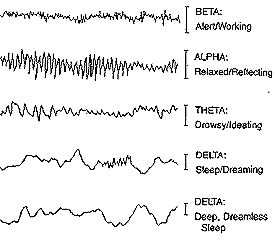Following up on the previous blog about meditation, I've been digging around for some interesting links on how meditative states correlate with brain waves. Here's a basic rundown on how:

(Graph from crystalinks)
The brain itself emits electromagnetic energy, and this brain activity differs according to its state (sleeping, awake, thinking etc). There is a growing amount of data about these brain states, specifically on how the act of meditation influences them. According to this chart, beta waves coincide with thinking/working/ activities, while on the other side of the spectrum there is delta, which indicates deep and dreaming/dreamless sleep. Meditation is often found with alpha/theta waves. I'd be curious to know where mindfulness meditation fits in this spectrum.
There are various sound waves that induce or help promote a particular brain state. Ever hear of the brainwave generator? It's been around for a few years now (at least). You can download the program, free and try it out. It has a very extensive list of different sounds which allegedly help for a number of tasks, from meditating to headaches. What are your thoughts on it? From giving it a shot, I admit it did induce something. I've tried it to help write papers, but I've found myself having to make an active effort to first clear out all other sounds, sit back and take it in. There does seem to be some kind of effect, for sure. I'm just not sure how extensive it is.
Next up on the list is Holosync. This project is by far a more extensive one. I haven't purchased the program, but there seems to be alot of positive hype about it. What I did manage to get is a demo CD. It did seem to have some effect, but not as strong as the Brainwave generator. This could have been because the Holosync CD had the president speaking for a good majority of the demo, while the sound waves played underneath. I found it to be a bit distracting.
Without making this too patchy, I think I'll end it here, and in the next blog (part 2) I'll dive into a related topic: the science behind meditation. There are a handful of really interesting experiments and debates over meditation and the brain. Stay tuned!

(Graph from crystalinks)
The brain itself emits electromagnetic energy, and this brain activity differs according to its state (sleeping, awake, thinking etc). There is a growing amount of data about these brain states, specifically on how the act of meditation influences them. According to this chart, beta waves coincide with thinking/working/ activities, while on the other side of the spectrum there is delta, which indicates deep and dreaming/dreamless sleep. Meditation is often found with alpha/theta waves. I'd be curious to know where mindfulness meditation fits in this spectrum.
There are various sound waves that induce or help promote a particular brain state. Ever hear of the brainwave generator? It's been around for a few years now (at least). You can download the program, free and try it out. It has a very extensive list of different sounds which allegedly help for a number of tasks, from meditating to headaches. What are your thoughts on it? From giving it a shot, I admit it did induce something. I've tried it to help write papers, but I've found myself having to make an active effort to first clear out all other sounds, sit back and take it in. There does seem to be some kind of effect, for sure. I'm just not sure how extensive it is.
Next up on the list is Holosync. This project is by far a more extensive one. I haven't purchased the program, but there seems to be alot of positive hype about it. What I did manage to get is a demo CD. It did seem to have some effect, but not as strong as the Brainwave generator. This could have been because the Holosync CD had the president speaking for a good majority of the demo, while the sound waves played underneath. I found it to be a bit distracting.
Without making this too patchy, I think I'll end it here, and in the next blog (part 2) I'll dive into a related topic: the science behind meditation. There are a handful of really interesting experiments and debates over meditation and the brain. Stay tuned!





